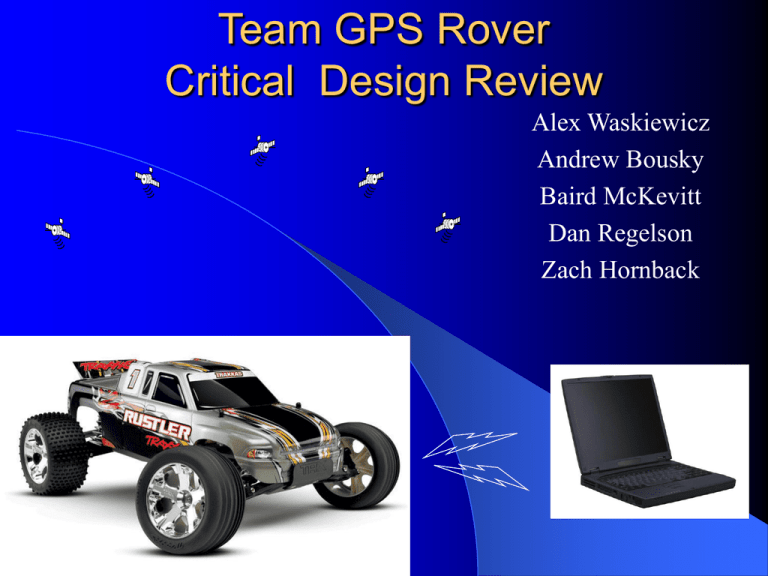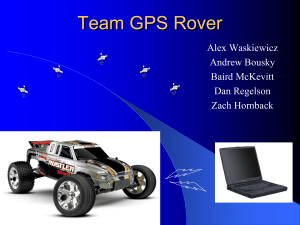(2.59 MB PowerPoint)
advertisement

Team GPS Rover Critical Design Review Alex Waskiewicz Andrew Bousky Baird McKevitt Dan Regelson Zach Hornback Overview Project Description Hardware Implementation Software Implementation Milestones Risks and Contingencies PROJECT DESCRIPTION Project Goals The human user will be able to remotely control the rover from a laptop computer – Direct driving control – Issue location commands Rover will calculate its current bearing Rover will calculate desired bearing to user specified location Rover will autonomously maneuver to its assigned destination Rover will transmit telemetry to the user Rover will sense and avoid obstacles Rover could have onboard camera(s) providing visual feedback to user. Rover could carry and deploy instrumentation packages – Examples: Rocket launch platform Environmental sensors Mechanical Manipulator HARDWARE IMPLEMENTATION VEHICLE Traxxas Rustler – 445x311x178 mm – 1.69 kg – Top Speed 35 mph – $203 with batteries – High Load Capacity – Replaceable parts Electronics Platform – Attaches to the chassis – Carries electronics, sensors, and batteries – Interfaces directly with car controls – Weight and Size are constraints Test: Steering and Driving The steering and speed of the vehicle can be controlled using the PWMs of the microcontroller. Both are controlled by altering the duty cycle of the input square wave. – The wave (for both steering and speed) has an amplitude of 4.2 Volts and a frequency of 49.75Hz •The duty cycles for steering are: •Straight – 7.72% •Full Left – 10.21% •Full Right – 5.37% •The duty cycles for driving are: •Idle – 7.46% •Full Forward – 9.95% •Full Reverse – 4.71 % Hardware Block Diagram Digital Compass GPS Module User PC SCI SCI Module Module I2C Microcontroller Module Proximity Sensors PWM PWM Module Module Drive Steering Motor Motor Test: GPS Parts Serial communication OOB Acquired outside signal Impressive spatial resolution (probably to WAAS enable) 1 Hz update rate – Documentation says modifiable and/or queryable but currently having technical difficulties Digital Compass $60 ½ degree resolution I2C interface Testing will be imminent once I2C communication on the development board is established Sensors Two-forward facing sensors to allow obstacle avoidance Ultrasonic: 2 x Devantech SRF08 Ranger ($62) 6m range I2C interface Testing will be imminent once I2C communication on the development board is established Development Board Serial Ports LCD DIP Switches LEDs Shaft Encoder Mini-Breadboard Great for testing! Power Subsystem 3.3V, 5V systems Need to pick battery Use of 2 voltage regulators – Need to pick type Will be implemented upon completion of PCB fabrication – Due to development board usefulness Microcontroller: Freescale HCS08 60K of low-speed Flash 4K of internal ram – Requires no external routing Internal A/D Internal PWM 3.3V Microcontroller: Freescale HCS08 Memory Map Internal module status/comm registers Preliminary PCB Layout: PCB: US1 US2 GPS 4 4 6 •Microcontroller •RF link •Voltage Regulators: Power Bus •Caps/Resistors V/R Power Altium Schematic SOFTWARE IMPLEMENTATION User Interface Data Flow Diagram HCS08 Hardware Interfaces Application Functions MILESTONES Milestone #1 (Implementation Cycle 1) User control with Arrow Keys – Serial Communication (tethered) – Independent PWM Control – Windows-based GUI Why? – Tests many subsystems that are required for GPS Control (i.e. Milestone #2) Milestone #2 (Implementation Cycle 2) GPS Feedback – GPS communication – Digital Compass communication (IIC) – Bearing calculation Implementation Cycle 3 Obstacle Avoidance – Left and Right Sensors with minimal common FOV – Left and Right allows for an easy avoidance algorithm Left sensor = high go Right Right sensor = high go Left Both = high requires long range detection to avoid DIVISION OF LABOR AND RESPONSIBILITIES ALEX •Windows XP GUI •Development board testing •Implement control software •GPS Module ANDREW BAIRD DAN ZACH •Schematic & PCB layout •Digital compass •Schematic and PCB layout •GPS module •Chassis Fabrication •Power Sub-system •Ultrasonic Sensors •Documenta tion •Chassis Fabrication •PWM interface •Power sub-system •Implement control software •Developm ent board testing SCHEDULE RISKS AND CONTINGENCY PLAN Updated Risks and Contingency • • • • • Parts availability and shipping times We have purchased many of our discrete components The car interface is electrically simple Interfacing I2C components Microcontroller RAM/Storage limitations RF Link Learning curve on design software (CodeWarrior & Altium) Power Consumption Questions?


